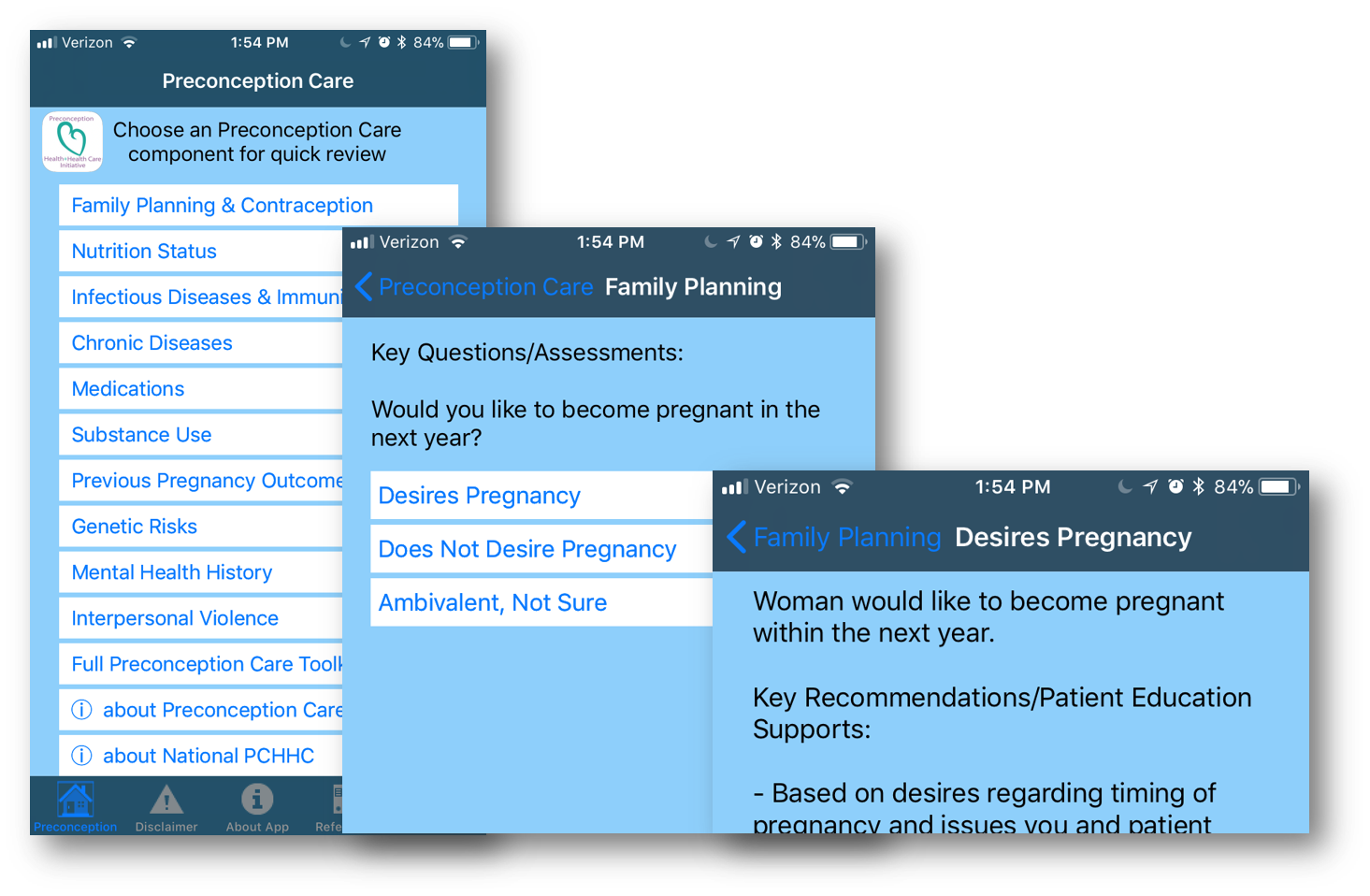symple_toggle title=”Resource Guide for Clinicians” state=”closed”]
Are you looking for the Clinical Resource “At Your Fingertips” Preconception Guide? An “At Your Fingertips” view of the Toolkit is available for women who desire pregnancy, those who are at risk/unsure of pregnancy, and for women who do not desire pregnancy.

- AMCHP’s Innovation Station – this toolkit provides evidence-based/-informed practices, reports, publications, and other resources that can be implemented at the state, territory and community levels.
- Zika Virus Preconception Counseling for Women and Men (CDC), found HERE.
- Disparities in Preconception Health Indicators – Behavioral Risk Factor Surveillance System, 2013-2015, and Pregnancy Risk Assessment Monitoring System, 2013-2014, MMWR Surveill Summ, January 2018
- Diabetes During Pregnancy: Surveillance, Preconception Care, and Postpartum Care, Journal of Women’s Health, May 2018
- The Link Between Reproductive Life Plan Assessment And Provision of Preconception Care At Publicly Funded Health Centers, Perspect Sex Reprod Health, September 2017
- Advancing preconception health in the United States: strategies for change, Upsala Journal of Medical Sciences, September 2016
- The future of preconception care in the United States multigenerational impact on reproductive outcomes, Upsala Journal of Medical Sciences, July 2016.
- Catalyzing a Reproductive Health and Social Justice Movement, Maternal and Child Health Journal, April 2016
- You Decide: Making Informed Health Choices about Hormonal Contraception Tool Kit (Planned Parenthood® Federation of America, Inc. and the Association of Reproductive Health Professionals), found HERE.
- Medical Eligibility for Initiating Contraception: Absolute and Relative Contraindications (The Reproductive Health Access Project), chart found HERE.
- The You Decide: Making Informed Health Choices about Hormonal Contraception Tool Kit is designed to help health care providers better understand and speak to the risks and benefits of hormonal contraception. This tool kit is part of a comprehensive educational program created by Planned Parenthood® Federation of America, Inc. (PPFA) and the Association of Reproductive Health Professionals (ARHP). The kit can be downloaded at no cost from here, and includes: 1) Self-Administered Patient History Form and Sample Physical Exam Form; 2) Contraceptive Efficacy Tools; 3) Patient Risk Comparison Tools; 4) Six-Step Plan: Responding to Announcements of Adverse Medical Events; 5) Additional Resources; and 6) Glossary of Risk Terms and bibliography for additional reading.
- Preconception Health Indicators for Public Health Surveillance, Journal of Women’s Health, April 2018
- Disparities in Preconception Health Indicators – Behavioral Risk Factor Surveillance System, 2013-2015, and Pregnancy Risk Assessment Monitoring System, 2013-2014, MMWR Surveill Summ, January 2018
- Making the Case: The Importance of Using 10 Key Preconception Indicators in Understanding the Health of Women of Reproductive Age, Journal of Women’s Health, June 2018
- Diabetes During Pregnancy: Surveillance, Preconception Care, and Postpartum Care, Journal of Women’s Health, May 2018
- The Link Between Reproductive Life Plan Assessment And Provision of Preconception Care At Publicly Funded Health Centers, Perspect Sex Reprod Health, September 2017
- A Paradigm Shift in Preconception and Interconception Care: Using Every Encounter to Improve Birth Outcomes, Zero to Three, April 2017
- Promoting Maternal and Infant Health in the 4th Trimester, Zero to Three, April 2017
- Interpregnancy Interval and Adverse Pregnancy Outcomes: An Analysis of Successive Pregnancies, ACOG, March 2017
- Interpregnancy Interval and Pregnancy Outcomes: Casual or Not?, ACOG, March 2017
Postpartum Health and Wellness: A Call for Quality Woman-Centered Care, Maternal and Child Health Journal, October 2016 - Advancing preconception health in the United States: strategies for change, Upsala Journal of Medical Sciences, September 2016
- Using the Reproductive Life Plan in contraceptive counselling, Upsala Journal of Medical Sciences September 2016
- The future of preconception care in the United States multigenerational impact on reproductive outcomes, Upsala Journal of Medical Sciences, July 2016.
- Recommendations for Health Systems to Measure and Index Preconception Wellness, Obstetrics & Gynecology, May 2016
- Preconception Wellness and Healthcare: Can We Practice (and Measure) What We Preach?, NEJM Journal Watch, May 2016 – PDF version
- Catalyzing a Reproductive Health and Social Justice Movement, Maternal and Child Health Journal, April 2016
- Preconception Care in Publicly Funded U.S. Clinics That Provide Family Planning Service American Journal of Preventive Medicine, 2016
- AAFP Preconception Care (Position Paper), American Academy of Family Physicians, December 2015
- Preconception Care to Reduce Maternal and Childhood Mortality and Morbidity Report (WHO), found HERE.
- Preconception Care: Maximizing the Gains for Maternal and Child Health, found HERE.
- Report on Preconception Clinical Screening Tools and Interventions, found HERE.
- Recommendations for the Routine Care of All Women of Reproductive Age, found HERE.
- Preconception Health Recommendations for Young Adults with Disabilities: A Final Report from an Action Learning Collaborative (Oregon Health Authority)
- Born Too Soon: The Global Action Report on Preterm Birth, 2012, “Care Before and Between Pregnancy”. To read chapter, click here. Born Too Soon was authored by a broad group of 45 international multi-disciplinary experts, edited by the March of Dimes and published by the World Health Organization. More than 50 organizations have endorsed the report. The full publication can be accessed here.
- Colorado Department of Public Health and Environment: Report on Nationwide Initiatives on Preconception Health (2012) click here.
- CDC: Executive Summary. Treating for Two: Safer Medication Use in Pregnancy Expert Meeting. Developing a systematic approach to safer medication use during pregnancy.
 All women and men of reproductive age will achieve optimal health and wellness, fostering a healthy life course for them and any children they may have.
All women and men of reproductive age will achieve optimal health and wellness, fostering a healthy life course for them and any children they may have.
